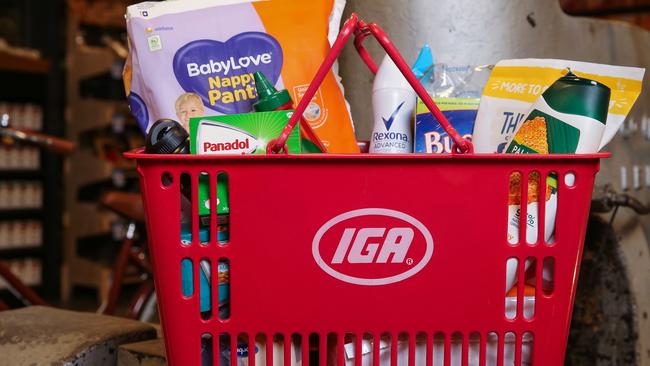Metcash: Shoppers turning to independent supermarkets to fill baskets as grocery prices continue to fall
Metcash boss Doug Jones says independent supermarket banners are increasingly winning over shoppers from the major chains as households continue to ‘cross shop’ at several stores.
Food and grocery prices have continued to moderate in the lead-up to Christmas, with shopping baskets and trolleys at independent stores such as IGA and Foodland filling up with more items, says Metcash chief executive Doug Jones.
Mr Jones, who leads the supermarket, food, liquor and hardware wholesaler Metcash, said the company’s independent supermarket banners were winning over shoppers from the major chains as households continued to carve up their weekly shopping lists to “cross shop” at a number of stores.
Speaking on Monday after Metcash unveiled its interim results, with a 12.2 per cent gain in profit to $141m as revenue rose 1.3 per cent to $7.837bn, Mr Jones said he would participate, if asked, in the Greens-led Senate inquiry examining whether customers of the major supermarkets were being subjected to “price gouging” during the cost-of-living crisis.
“Certainly the focus is on the two majors (Woolworths and Coles) … we think that the independent network plays a very important role in providing shoppers with value, differentiation and choice, which is the fundamental pillar of competition,” Mr Jones said.
He said Metcash would support a reversal of the onus of proof in creeping acquisitions, which could delay moves by Woolworths and Coles into new sectors and regions.
Meanwhile, Metcash has lifted its sales and profitability for the half year to October 31, as more shoppers visited its stores such as IGA, Cellarbrations and Total Tools. However, rising costs – which Metcash has tried to flatten through a cost-cutting program – and falling profits at parts of its hardware division saw its underlying earnings decrease by 3.4 per cent to $246.5m, while underlying profit after tax fell 10.9 per cent to $142.5m.
The food pillar, which sells into independent supermarket chains such as IGA and Foodland and delivers the bulk of Metcash’s earnings, delivered earnings growth of 3.6 per cent to $101.7m, reflecting the strong trading performance and improved leverage. Sales for its food and supermarkets arm rose 0.6 per cent to $4.732bn.
The company declared an interim dividend of 11c a share, fully franked, down from 11.5c, to be paid on January 30.

Mr Jones said that analysis of food and grocery prices showed that wholesale price inflation moderated through the half with inflation of 7.7 per cent in the first quarter and 5.3 per cent in the second quarter, and 6.5 per cent for the half.
He said volumes were picking up as shoppers put more in their baskets and Metcash won over more consumers. Shoppers were also buying more private label items.
“There is continued growth in (store) foot traffic, which is very pleasing. Shoppers are undoubtedly looking around and looking for value, and we are seeing strong growth of private label, up 19.2 per cent, which is pleasing.
Mr Jones said Metcash’s independent stores were convincing consumers that savings were possible at IGA or Foodland, as they were at Aldi, Woolworths and Coles.
“The proposition in our network is around convenience, local service, local ranges, something different for the family.
“As people are eating at home, or they are looking for ways to save money but keep their family fed and entertained … they’re finding that in the IGA network they don’t have to pay more.”
Mr Jones said frozen food was continuing to trade well as households looked to save money, but with fresh food in deflation there was also a shift to fresh foods.
The news was well received by investors, with Metcash shares up 2.5 per cent to $3.64 in a higher market early on Monday morning. The stock later closed up 4c at $3.59.
Jarden analyst Ben Gilbert said the Metcash’s half-year result “looks OK” with earnings 1 per cent ahead of consensus but below Jarden’s forecast.
“It’s a solid result in a tough market, although we had expected hardware to be stronger, which was impacted by higher costs, while grocery was actually a beat when excluding $2.8m of restructuring costs,” Mr Gilbert said.
“Pleasingly, the second half has started well and Metcash will execute a $14m-$16m cost-out program, equivalent to around 3 per cent of group EBIT, which should give the market confidence in the earnings outlook.
“Overall, looks solid with a better food result, cost-out program and strong cash flow all supportive of a higher multiple.”






To join the conversation, please log in. Don't have an account? Register
Join the conversation, you are commenting as Logout